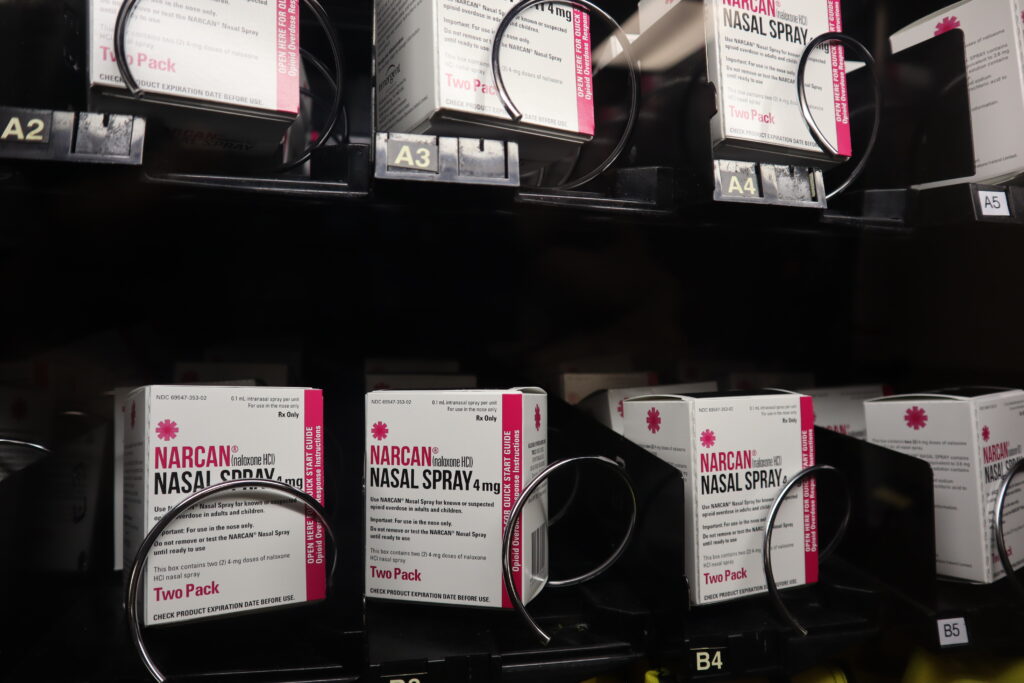Bill Would Increase Penalties For Those Supplying Drugs That Lead To Death
But some legislators, including Ryan Clancy, speak out against increasing reckless homicide penalty.

Nasal Narcan, used to reverse an overdose, stock the inside of Milwaukee County’s first harm reduction vending machine. Photo by Isiah Holmes/Wisconsin Examiner.
A Republican-crafted bill to increase reckless homicide penalties for people involved in drug overdose deaths passed the Assembly Wednesday on a voice vote. The bill increases existing penalties for providing drugs which result in a death from 40 years to 60 years. While framed as a way to punish drug suppliers, the bill drew familiar criticisms Wednesday for lacking protections for people who use drugs with others — including friends who call for help when someone overdoses. A companion bill passed the Senate by a vote of 28-3 back in March.
Although the opioid and fentanyl crisis was often invoked in debate over the bill, those drugs are not specifically mentioned in its text. The bill covers “certain Schedule I or Schedule II controlled substances, controlled substance analogs, or ketamine or flunitrazepam.” While the legislation is mostly backed by Republican lawmakers, Rep. Shelia Stubbs (D-Madison) signed on as well. Prior to the vote Wednesday, some of her Democratic colleagues rose in opposition to the bill.
Rep. Ryan Clancy (D-Milwaukee) highlighted that over the last five sessions, the Legislature has sat down 144 times to either increase penalties for existing crimes, or create new penalties for things which hadn’t been illegal before. “And it’s not working,” said Clancy. “I’d be hard pressed to find a single time when we reduce the penalties on something. Because to do that, we would have to look at the fact that we can’t incarcerate our way or arrest our way out of many of the problems that we have.”
At the local level in Milwaukee, Clancy has focused on the conditions of detention facilities. He recalled the difficult experience of visiting the Milwaukee Secure Detention Facility (MSDF). “I’ve been inside many institutions,” said Clancy, “and I thought that I was hardened to it somewhat, but this one just broke me. And it’s because so many of the people that we incarcerate there are literally begging us for services.” Many people who were detained in MSDF during Clancy’s visit mentioned that a relapse played a role in their continued incarceration. “It is absolutely heartbreaking to talk to folks saying, ‘I want to better myself, I want not to be incarcerated again. I want to leave this place and not do the drug that put me in here in the first place,’ but there is no programming available.”
Clancy wondered why instead of addressing these issues, the Legislature is creating ways to keep people in longer. He argued that this does not solve drug problems, and that the position of the bill’s authors isn’t supported by data. “I urge just not to focus on symbolic action that does more harm to these same communities, but on the solutions that we know will work,” said Clancy. “Our communities deserve better.”
Rep. Barbara Dittrich (R-Oconomowoc) countered, saying she had a family member who was arrested for drug use and distribution. Dittrich advocated for incarceration saying, “Sometimes being behind bars still has the ‘scared straight’ effect in our communities.” She added that this worked for her own family member saying, “That jail time, and Huber time, was enough to force my loved one to get their act together, to get a car, to get back to school, get a degree, get a job. And realize there is a better way of dealing with your problems in life than being out there trying to make a quick buck hustling drugs.” Dittrich said, “I hope all of you try to think of what would you feel like in my place.”
Rep. Lisa Subeck (D-Madison), spoke after Dittrich, pointing to a key issue with the bill. If two people were sharing drugs and one person dies from an overdose, then the other would be exposed to reckless homicide charges under the new legislation, especially if the surviving person is the one who purchased the drugs from a dealer. The bill carves a giant hole in Wisconsin’s Good Samaritan Law, which would otherwise protect a survivor who called for help. Under the bill, calling for help during a fatal overdose could result in a 60-year sentence. “And that worries me,” said Subeck.
“I worry that we actually, every time we make these penalties harsher, we may actually see lives lost as a result.” Subeck added, “I believe that there absolutely should be consequences. I believe those consequences should be significant. I don’t think we’re at the point where we should be making this a life sentence.”
Such arguments did little to sway Republican lawmakers, however, including Rep. Robert Brooks (R-Saukville). “This is an issue that has become important to me even more so… in the last month or so,” Brooks said. That’s because four people overdosed from fentanyl-laced cocaine sold by a regular customer at a Saukville bar Brooks has owned since 2007. One of the people, Nick Hamilton, died from the overdose. The others survived their overdoses, though one woman was mauled by a dog while she was unconscious. According to the Associated Press, drug complaints have persisted at the bar for years. Brooks has distanced himself from the incident and pushed back against calls for more security cameras and other measures to be taken at the bar. Brooks has supported tough on drugs legislation including the reckless homicide bill.
“I can tell you that we can’t do everything, we can’t put cameras every place, police can’t be in every business on every street corner,” said Brooks. Yet, he went on to say, “We need to crack down on the crime.” He added, “This is not a victimless crime. We need to crack down on this. We need to take those harsh steps.” Brooks suggested maybe “low level users” could become useful due to the new law, because “we can leverage them to get those higher users.” Going back to his own situation Brooks said, “My heart goes out to those communities that this is beyond a newsflash and I’ve had to deal with it for a month now.”
Rep. Angie Sapik (R- Lake Nebagamon) also expressed little sympathy for people struggling with drug addiction. She said, “I’m in a room with legislators saying that it is our responsibility to provide treatment programs for the drug dealers. It’s amazing. This is absolute madness.”
The author of the bill, Rep. Scott Allen (R-Waukesha) spoke last before the bill was voted on. Allen argued that Michigan, Florida, Louisiana, and New Hampshire have laws that make reckless homicide by overdose punishable with a life sentence. Allen said that his bill elevates homicide by overdose to the level of other reckless homicide charges for other causes of death. In February when the bill was first being explored, Wisconsin Examiner asked Allen whether it would have any exceptions for friends using drugs together. Allen said such and exception would leave a loophole in the law that would be exploited.
Four law enforcement lobbying groups registered in favor of the bill, as well as the Wisconsin Truck Group. The American Civil Liberties Union (ACLU) of Wisconsin registered against the bill. After it passed the Assembly, the ACLU condemned the bill, stating that it adds to the damage caused by Wisconsin’s Lens Bias law, under which someone can be charged with murder for providing drugs that result in an overdose.
“Far from being exclusively reserved for drug kingpins or major dealers, the law does not account for the fact that people close to each other routinely share and use drugs together, and that tragic, unanticipated overdoses can happen,” the statement read. “While reducing rates of overdose deaths is certainly an urgent priority, SB-101 won’t alleviate the crisis. An extensive body of research — as well as our own lived experiences — tell us that punitive drug laws don’t reduce drug use, substance abuse disorder, or overdoses. In fact, Lens Bias Laws actually make it less likely that someone will seek help for someone suffering an overdose because they fear potential prosecution.”
The ACLU urged Gov. Tony Evers to veto the bill. Rep. Francesca Hong (D-Madison) and Clancy also issued statements after the vote. Hong said the bill “perpetuates the very issues that have gotten us to this point in the first place.”
Reckless homicide for overdose bill moves closer to passage was originally published by the Wisconsin Examiner.
If you think stories like this are important, become a member of Urban Milwaukee and help support real, independent journalism. Plus you get some cool added benefits.





















What are the Wisconsin National Guard, the US Military, and anyone else in government doing to reduce the importation of drugs?
Drugs come from somewhere, and it should be possible to stop them from entering the United States. China isn’t killing US civilians – however, tens of thousands are dying. Is the real threat drugs? The trillions spent on the US Military don’t effectively protect the people in the United States. (Where was the US Military helping stop the Canadian wildfires?)
And we’re not spending money to increase the size of the State Crime Lab??